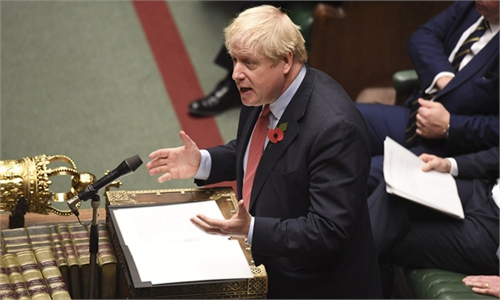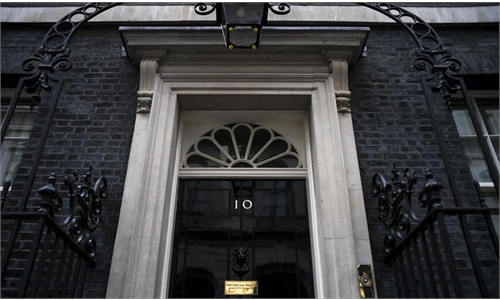
Illustration: Liu Rui/GT
After cutting itself off from the European Union, Britain put forward its Global Britain vision in an attempt to rebuild the UK's image as a great world power. Martin Jacques, a British academic, recently tweeted that, "'Global Britain' is a deceit. The UK is in retreat: deprived of its biggest market (Europe), seeking solace in a declining Anglophone world (Five Eyes), unable to embrace China as crucial to its future." Is Global Britain really a British strategic deceit?
The aim of the Global Britain vision is to respond to an "increasingly competitive global environment, according to the UK's Integrated Review of Security, Defense, Development and Foreign Policy released on March 16. The UK wants to ensure it can continue to be a successful participant in global diplomacy and build mutually beneficial bilateral relationships and alliances on a wider scale.
As far as current reality is concerned, however, the Global Britain strategy does not reflect the basic characteristics it should have. In terms of bilateral relations between the UK and the EU, Brexit greatly alienated bilateral relations politically and economically. It has also deeply damaged the goodwill of people on both sides of the English Channel. The trust that underlies the UK-EU relationship is at its worst since WWII. After all, an increasingly moody British government is pushing the EU further away. How can the UK talk about a global strategy if it can't get on well with its important neighbors?
Bilateral relations between China and the UK have taken a sudden turn since the start of 2020. It has almost destroyed the fruitful results of the UK-China "golden era." Britain has been actively acting as the pawn of the US in the past year and showing a high-profile stance on containing China. Since the adoption of national security law for the Hong Kong Special Administrative Region, anti-China activities have become increasingly frequent in British politics. The Conservative Party and a large number of backbenchers in the British Parliament have been living in a dream of the old colonial era, lacking a deep awareness of the basic realities of the international community.
Ultimately, the traditional mentality of British diplomacy and the domestic political ecology of Britain have determined that the country cannot accept its increasingly passive diplomatic position in China-UK relations. Thus, actively opposing Beijing is seen as the "best way" for London to maintain a balanced pattern with bilateral relations. The question is: without a friend like the world's second-largest economy, what future is there for the Global Britain strategy?
Even bilateral relations and alliances between the UK and the US have not shown any signs of favoring Britain. Quite the contrary, post-Brexit Britain has already taken a back seat to Washington's diplomatic strategy. Now it seems that post-Brexit Britain really needs to reposition its rightful place in the international community.
The Global Britain strategy is definitely not a hoax deliberately promoted by the British government. London is unwilling to accept a post-Western era. It has missed many great opportunities for independent development because of its hostility and suspicion of the rise of non-Western countries. China-UK relations are a vivid example.
In terms of its own strength, the UK does not have enough leverage to adopt a Global Britain diplomatic strategy. Brexit has cost the UK a great deal of political capital and social costs. Currently, Britain is facing domestic problems, and is deeply mired in an economic crisis. As a result, the Global Britain strategy lacks the most important material basis.
All in all, it is not realistic for the UK to talk about a Global Britain strategy, because the country has lost its most important strategic autonomy. At a time in history when the world's political landscape has become more volatile, London remains in the strategic ambiguity limbo.
However, Britain is still an active political player with the resources to participate in global politics. The new international political structure needs a brand-new strategic thinking. In this sense, emancipating the mind and seeking truth from facts are also appropriate for London's future development path.
The author is director of the Centre for British Studies, Shanghai International Studies University. opinion@globaltimes.com.cn


